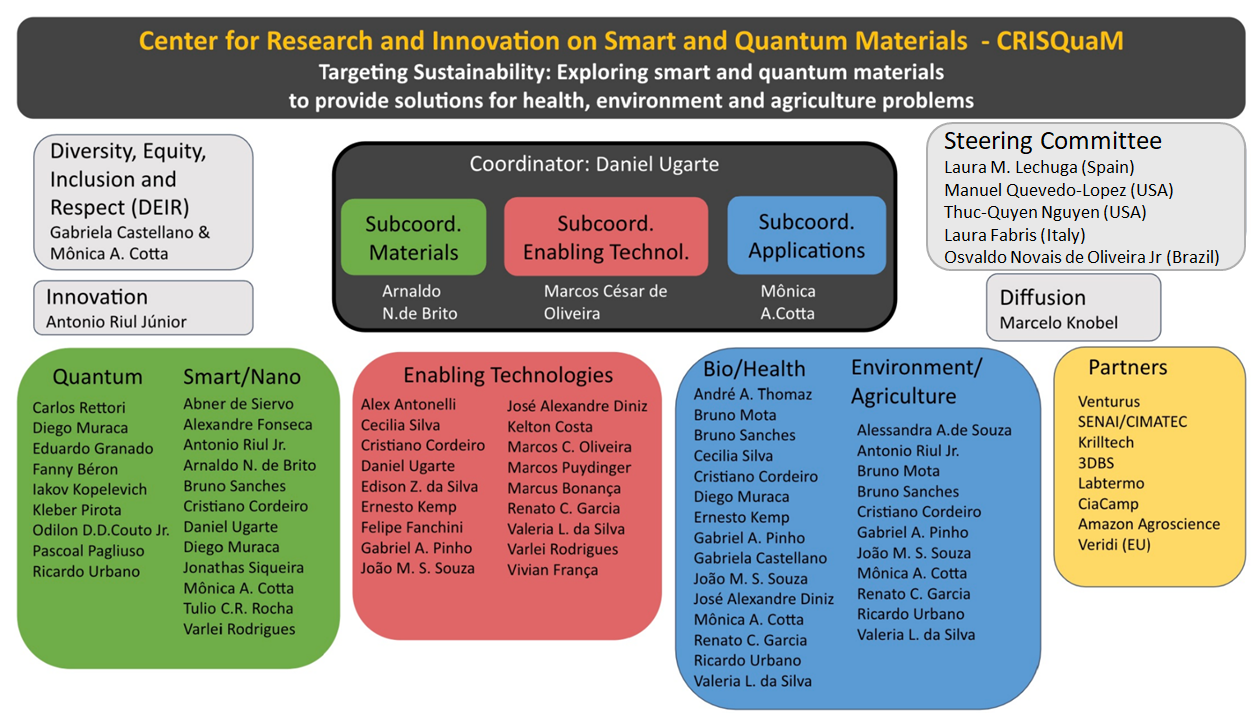BV-FAPESP: research projects supported in this Center
CRISQuaM in the Media: news about the center
CRISQuaM aims to explore the synergistic development of fundamental and applied science to create new materials with high potential for the construction of devices and sensors to address technological challenges related to sustainability, climate change, precision agriculture, ecology, and health. To achieve these goals, we have assembled an interdisciplinary and collaborative research team, integrating expertise across various scientific domains, researching novel materials with high innovation potential. By combining original synthesis methods, advanced characterization techniques, theoretical approaches, computational simulations, quantum technologies, and device construction designs, we aim to drive advances in smart and quantum materials, promoting scientific excellence and technological development. With this, we plan disruptive innovations in instrumentation—including hardware and AI-based tools—as well as in quantum technologies, biomedical devices, and signal processing, in addition to plant bionics, exploring plant-pathogen interactions. Besides research activities, we plan intensive actions in education, dissemination, and communication for the general public, as a modern society should be aware of the challenges humanity faces and how research and technology are essential for responsibly utilizing the planet's limited resources. CRISQuaM's Innovation activities are accelerated through partnerships with several companies in related technologies, many of them Brazilian. Finally, all activities of the Center are managed in accordance with diversity, equity, and inclusion goals and best practices.
The Center brings together scientists, engineers, and innovators in a collaborative effort to apply materials science and quantum technologies at the cutting edge, designing new materials and nano(bio)sensors for advanced diagnostics. The Center has a team capable of producing a wide range of (nano/micro) materials, along with precise chemical and physical characterizations using modern techniques (synchrotron, advanced microscopy, magnetotransport, magnetic resonance, optics, etc.). In addition, the team offers various options in enabling technologies, including miniaturization, processing, and additive manufacturing, as well as instrumentation, quantum sensing, and electronics development. Data analysis will employ updated approaches (numerical simulation, classical and quantum machine learning, and quantum optimization). Applications at the knowledge frontier will address urgent sustainability needs in environmental areas, precision agriculture, plant bionics, and biomedical interfaces, contributing to the development of local technologies in close partnership with the Brazilian industry.
The organization of the Center is based on three pillars — Materials, Enabling Technologies, and Applications — together with partner companies, as described in the figure below.

2024-07-24
The novel compound was developed in the lab but can be produced with technology already used by the industry, facilitating scale-up. It fixes phosphorus in the soil for future crop cycles and requires fewer applications. The researchers are seeking partners to mass-produce it for use in large-scale experiments.
2024-07-24
Researchers at the Federal University of São Paulo determined for the first time the vertical limits of the subtropical ocean region off the South American coast. They found that the upper limit of the mesotrophic zone, previously assumed to be 30 meters below the surface, was in fact in much shallower waters.
2024-07-24
The group uses advanced technology to map sites where vestiges of the activities of ancient populations have been preserved but risk being destroyed by the advance of deforestation, wildcat mining and climate change.
2024-07-24
Brazilian researchers innovated by stimulating tumor cells so much that they became stressed and could survive only by behaving like healthy cells. The results of the study were so promising that the researchers plan to hold clinical trials with patients, to be conducted in the Netherlands before the end of 2024.
2024-07-24
Lack of a method to classify forest succession stages in the applicable legislation allows for destruction of forest areas that provide important ecosystem services. The authors propose changes to make measurements more accurate and eliminate a step in permit applications that is ineffective and costly for landowners.
2024-07-24
A study involving 302 volunteers showed that although the damage caused by SARS-CoV-2 was most intense among those who had severe COVID-19, some exhibited memory loss and attention deficit more than 18 months after being infected, even though they had not needed to be hospitalized.
2024-07-17
Scheduled to start operating in 2028 at the Brazilian Center for Research on Energy and Materials (CNPEM) in Campinas (São Paulo state), the lab will enable researchers for the first time in Latin America to study viruses classified as class 4, the highest category of biological risk.